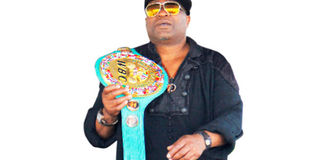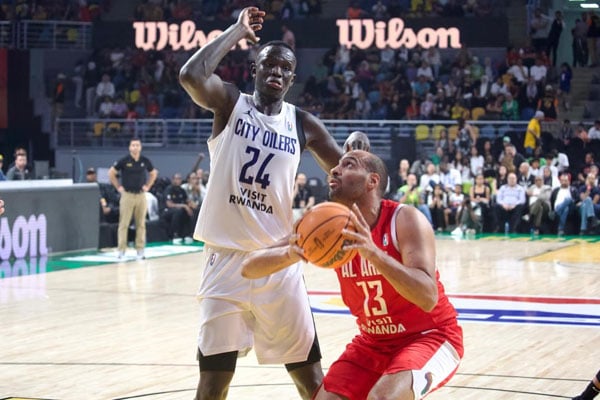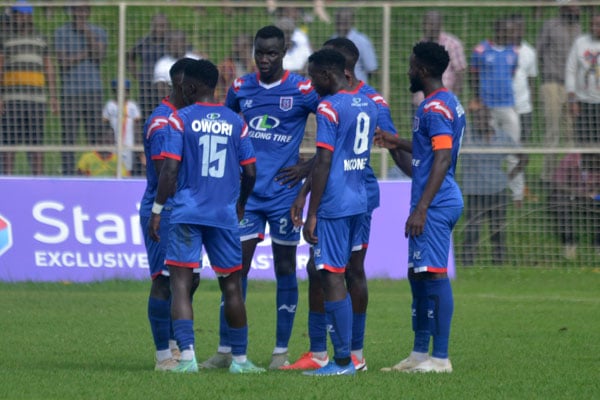Mugabi was Uganda’s silver bullet at 1980 Moscow Games

Mugabi on arrival at Entebbe International Airport during his eventful visit to Uganda in 2015. PHOTOS/ISMAIL KEZAALA
August 2, 1980, Saturday a 20-year old boy walked into the ring of the Olympic Sports Complex in Moscow, as Uganda’s remaining hope for gold, actually the first since John Akii-Bua’s at Munich ‘72.
John Mugabi, who would later become known as “The Beast,” was on a terrific run, having knocked out three of his four victims. But could this first-timer thrive where 12 Ugandans had dived, especially against a seasoned fighter who boasted 12 wins in 13, moreover in his second Olympics final?
The build-up
Four years earlier Mugabi had flashed his potential to the world when, at 16, he bagged the welterweight silver medal after losing the final of the 1976 Junior Amateur World Boxing Championships to UK’s Herol Graham.
Two years later, the 18-year old got bronze at the 1978 All-Africa Games in Algiers, Algeria. Vicky Byarugaba, who won gold, recalls a hard-punching Mugabi staggering his opponent twice, but not “hungry enough to finish him off.”
Then came Moscow 1980, the second of three Olympic editions rocked by politically motivated boycotts. Montreal ‘76 by Africa due to apartheid; Moscow ’80 by USA and allies due to USSR’s invasion of Afghanistan and later Los Angeles ’84 by USSR, probably as a revenge for USA’s boycott four years earlier.
Mugabi reminisces the Moscow campaign with delight and regret. “Look, I was the last man standing on Team Uganda after all the others had lost,” he told me with a smug during his eventful visit in 2015. In the final, Mugabi insists he defeated Andrés Aldama although the Cuban was announced the victor. “They just robbed me of that victory because Aldama was Cuban. I knocked him down twice and everyone was singing my name but he stole my Gold.”
John Munduga, Mugabi’s big-time friend, who was on that team, had told us that immediately after the fight, Aldama was rushed to hospital. But when Uganda coach Peter Grace Sseruwagi suggested a visit to Aldama, in a spirit of sportsmanship, Mugabi vehemently refused. Fourty years on, he has not forgiven that ‘robbery.’
He is not alone. Charles Lubulwa and Mickey Duff, who would soon become Mugabi’s promoter manager in the paid ranks, said his man deserved gold.
However, after my 2015 profile of Mugabi, Zambian historian Jonathan Musere, who has written comprehensively about African boxing, wrote back to me dismissing Mugabi’s claims. Like he had written in his 2010 article, Musere reiterated that Aldama won deservedly.
I have since watched this fight several times and I agree with Musere. First, none of these hard-punchers sent the other down. And in fact, it was Mugabi who staggered in the final round.
This welterweight final was between two hard-fighting pugs separated by age and experience. In the red corner Aldama, who had fought across the globe, and only lost the 1976 Olympics final to American Sugar Ray Leonard—his only loss in four years.
Aldama had also won gold at the 1979 Pan African Games in Puerto Rico after defeating Jamaica’s future world champion Mike McCallum in the final.
In the blue corner was Mugabi, four years younger, and at his first Olympic tournament.
Both had had a good run to the final: Aldama, having stopped two of his opponents and outpointed the other two. Meanwhile, Mugabi having stopped three on the trot, and outpointed Polish Kazimierz Szczerba in the semifinal.
Aldama was one of the eight Cuban finalists (six of won gold). Mugabi was Uganda’s only finalist.
The first round begun with both boxers cautious throwing less effective jabs. However, in the last minute Mugabi showed more hunger, with some serious jabs, but Aldama, two inches taller, used his height advantage to evade most of them.
During the first interval, Coach Sseruwagi, sporting an Afro like his fighter, and a red jacket, was heard telling Mugabi in Swahili: “Mikono juu, left inayingiya, right inakuja…hapana babaika…” (Guards up, jab with your left, then follow with the right…don’t worry).
Ironically, it was Aldama who ruled the second stanza, with clear shots to Mugabi’s head, which shook up the ‘challenger’.
Mugabi tried to counter, but the Cuban southpaw, occasionally confused Mugabi whenever he switched stances.
In the second interval, Sseruwagi asked for urgency and it paid off. Mugabi scored more in the third round hitting the opponent’s head with visible power in an end-to-end round.
But Aldama still looked to have a competitive edge. Three minutes can be too short if you are trailing, especially against an opponent in winning mode. Mugabi’s raw power is unquestionable, but his defensive inabilities, even witnessed in his pro career, exposed him.
The judged scored the fight 4-1 for Aldama. Mugabi congratulated him with a hug. No sign of remonstration. He settled for silver.
Significance
Mugabi was Team Uganda’s flag bearer, and incidentally became the only medal winner as Uganda finished 32nd among 36 nations. It was a dismal performance by a team of seven boxers and six track and field athletes (all men), a decline from the 24th placement at the Munich ‘72 edition.
World-beater Akii-Bua was now a shadow of himself, battling troubles of war, persecution and exile—and did not go past the semifinals of the 400m hurdles, before losing the 4 × 400 m relay heats alongside Pius Olowo, Charles Dramiga and Silver Ayoo.
Mugabi was Aldama’s last opponent (Cuban athletes were not allowed to go professional). But this was just the beginning of Mugabi’s transition into boxing stardom.
Soon afterwards, renowned agent Jack Edwards helped Mugabi flee war-hit Uganda to UK, where he joined legendary match-maker Duff and trainer George Francis, who mentored him into a reputable fighter; a world brand of the ‘80s. Nine years later, Mugabi won the coveted WBC World Super Welter Title.
In 2012, Mugabi was inducted into the International Boxing Hall of Fame in Canastota, New York, alongside the legendary Ghanaian Azumah Nelson.
Ironically Mugabi’s stellar pro career coincided with Uganda’s decline in Olympic ranks. For 16 years no Ugandan ever stepped on the Olympic podium until sprinter Davis Kamoga got bronze at Atlanta ’96.
And 40 years on, no Ugandan boxer has ever touched an Olympic medal.
AT A GLANCE
Full Name: John Mugabi
Nickname: The Beast
Born: March 4, 1960
Age: 60
Birth Place: Nakawa
Greatest Honour: 1980 Olympics Silver Medal
Division: Welterweight
Stance: Orthodox
Height: 5 ft 8½″
Reach: 188cm
MUGABI’S OPPONENTS IN MOSCOW
1. Andres
Aldama (L)
2. Kazimierz Szczerba (W)
3. Mehmet Bogujevci (W)
4. Paul Rasamimanana (W)
5. Georges Koffi (W)
UGANDA’S OTHER BOXERS
1. Charles Lubulwa (Light Fly)-quarter
2. John Siryakibbe (Bantam)
3. Geofrey Nyeko (Light)
4. John Munduga (Light Welter)
5. George Kabuto (Light Middleweight)
6. Peter Odhiambo Middleweight Coach: Peter Grace Sseruwagi




